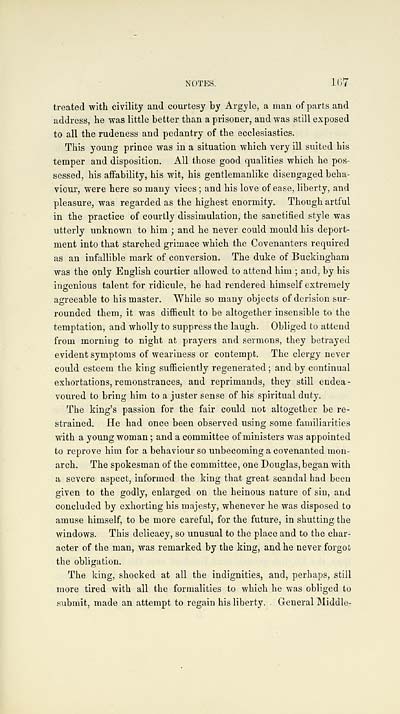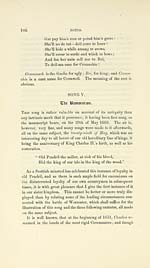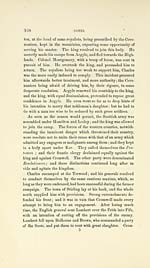Glen Collection of printed music > Printed music > Jacobite relics of Scotland > [First series]
(191) Page 167
Download files
Complete book:
Individual page:
Thumbnail gallery: Grid view | List view

NOTES. 107
treated with civility and courtesy by Argyle, a man of parts and
address, lie was little better than a prisoner, and was still exposed
to all the rudeness and pedantry of the ecclesiastics.
This young prince was in a situation which very ill suited his
temper and disposition. All those good qualities which he pos-
sessed, his affability, his wit, his gentlemanlike disengaged beha-
viour, were here so many vices ; and his love of ease, liberty, and
pleasure, was regarded as the highest enormity. Though artful
in the practice of courtly dissimulation, the sanctified style was
utterly unknown to him ; and he never could mould his deport-
ment into that starched grimace which the Covenanters required
as an infallible mark of conversion. The duke of Buckingham
was the only English courtier allowed to attend him ; and, by his
ingenious talent for ridicule, he had rendered himself extremely
agreeable to his master. While so many objects of derision sur-
rounded them, it was difficult to be altogether insensible to the
temptation, and wholly to suppress the laugh. Obliged to attend
from morning to night at prayers and sermons, they betrayed
evident symptoms of weariness or contempt. The clergy never
could esteem the king sufficiently regenerated ; and by continual
exhortations, remonstrances, and reprimands, they still endea-
voured to bring him to a juster sense of his spiritual duty.
The king's passion for the fair could not altogether be re-
strained. He had once been observed using some familiarities
with a young woman ; and a committee of ministers was appointed
to reprove him for a behaviour so unbecoming a covenanted mon-
arch. The spokesman of the committee, one Douglas, began with
a severe aspect, informed the king that great scandal had been
given to the godly, enlarged on the heinous nature of sin, and
concluded by exhorting bis majesty, whenever he was disposed to
amuse himself, to be more careful, for the future, in shutting the
windows. This delicacy, so unusual to the place and to the char-
acter of the man, was remarked by the king, and he never forgot
the obligation.
The king, shocked at all the indignities, and, perhaps, still
more tired with all the formalities to which he was obliged to
submit, made an attempt to regain his liberty. General Middle-
treated with civility and courtesy by Argyle, a man of parts and
address, lie was little better than a prisoner, and was still exposed
to all the rudeness and pedantry of the ecclesiastics.
This young prince was in a situation which very ill suited his
temper and disposition. All those good qualities which he pos-
sessed, his affability, his wit, his gentlemanlike disengaged beha-
viour, were here so many vices ; and his love of ease, liberty, and
pleasure, was regarded as the highest enormity. Though artful
in the practice of courtly dissimulation, the sanctified style was
utterly unknown to him ; and he never could mould his deport-
ment into that starched grimace which the Covenanters required
as an infallible mark of conversion. The duke of Buckingham
was the only English courtier allowed to attend him ; and, by his
ingenious talent for ridicule, he had rendered himself extremely
agreeable to his master. While so many objects of derision sur-
rounded them, it was difficult to be altogether insensible to the
temptation, and wholly to suppress the laugh. Obliged to attend
from morning to night at prayers and sermons, they betrayed
evident symptoms of weariness or contempt. The clergy never
could esteem the king sufficiently regenerated ; and by continual
exhortations, remonstrances, and reprimands, they still endea-
voured to bring him to a juster sense of his spiritual duty.
The king's passion for the fair could not altogether be re-
strained. He had once been observed using some familiarities
with a young woman ; and a committee of ministers was appointed
to reprove him for a behaviour so unbecoming a covenanted mon-
arch. The spokesman of the committee, one Douglas, began with
a severe aspect, informed the king that great scandal had been
given to the godly, enlarged on the heinous nature of sin, and
concluded by exhorting bis majesty, whenever he was disposed to
amuse himself, to be more careful, for the future, in shutting the
windows. This delicacy, so unusual to the place and to the char-
acter of the man, was remarked by the king, and he never forgot
the obligation.
The king, shocked at all the indignities, and, perhaps, still
more tired with all the formalities to which he was obliged to
submit, made an attempt to regain his liberty. General Middle-
Set display mode to: Large image | Transcription
Images and transcriptions on this page, including medium image downloads, may be used under the Creative Commons Attribution 4.0 International Licence unless otherwise stated. ![]()
| Special collections of printed music > Glen Collection of printed music > Printed music > Jacobite relics of Scotland > [First series] > (191) Page 167 |
|---|
| Permanent URL | https://digital.nls.uk/91269091 |
|---|
| Shelfmark | Glen.194 |
|---|---|
| Additional NLS resources: | |
| Attribution and copyright: |
|
| Description | Being the songs, airs, and legends, of the adherents to the house of Stuart. Collected and illustrated by James Hogg. Edinburgh: Printed for William Blackwood, 1819-1821. [First series] -- second series. |
|---|---|
| Shelfmark | Glen.194-194a |
| Description | Scottish songs and music of the 18th and early 19th centuries, including music for the Highland bagpipe. These are selected items from the collection of John Glen (1833 to 1904). Also includes a few manuscripts, some treatises, and other books on the subject. |
|---|
| Description | The Glen Collection and the Inglis Collection represent mainly 18th and 19th century Scottish music, including Scottish songs. The collections of Berlioz and Verdi collected by bibliographer Cecil Hopkinson contain contemporary and later editions of the works of the two composers Berlioz and Verdi. |
|---|

